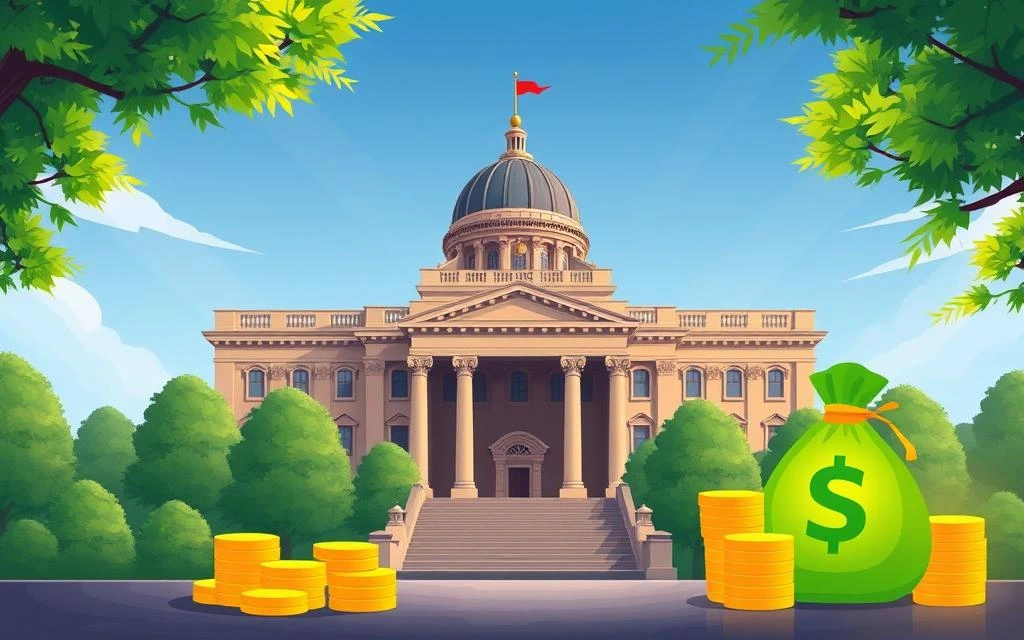Did you know the U.S. government invests over $40 billion annually in small business loans and financing programs? This vast network of government-backed funding can be a game-changer for aspiring entrepreneurs. It offers a financial boost to turn business dreams into reality.
Whether you’re launching a startup, expanding an existing enterprise, or navigating the post-pandemic economy, government loan programs can provide the capital you need. This guide will explore the various government financing options, eligibility criteria, and steps to secure funding. It aims to help you kickstart your entrepreneurial journey.
Understanding Government Small Business Loan Programs
The U.S. government has a variety of loan programs for small businesses and startups. These options are crucial for entrepreneurs looking to start their ventures. They are especially helpful for those from underrepresented communities or with limited access to traditional banking.
Types of Government Loans for Startups
Small business owners can look into several government-backed loan options. These include:
- SBA loans (7(a) and 504 programs)
- Microloans for small-scale financing
- Specialized loans for minority-owned and veteran-owned businesses
Eligibility Requirements for Government Financing
To qualify for these government small business loan programs, entrepreneurs must meet certain criteria. These include:
- Established credit history and financial viability
- Collateral or assets to secure the loan
- A comprehensive business plan demonstrating the venture’s potential for success
Understanding government financing helps small business owners navigate the application process. This way, they can access the capital needed to make their entrepreneurial dreams a reality.
How to Get a Loan to Start a Business from the Government
Getting a government-backed loan for your business can be a rewarding journey. It may seem daunting at first, but with the right preparation, you can navigate it confidently. We’ll guide you through the application process, explaining the required documents, the application steps, and the approval timeline.
First, research the different government loan programs. Look into SBA loans, business grants, and other startup financing options. Each program has its own eligibility criteria and application guidelines. It’s crucial to find the one that suits your business needs best.
- Gather the necessary documents: You’ll need your business plan, financial statements, personal and business credit history, and any other requested information.
- Submit your loan application: With all documents in hand, start the application process. This can be done online, in person, or through a designated lender.
- Understand the approval timeline: Loan approval times vary by program and lender. Be prepared for a wait of several weeks or even months. Stay patient throughout the process.
Remember, securing a government loan is competitive. A strong, well-researched business plan and a clear repayment ability are key. With proper preparation and persistence, you can boost your chances of getting the government funding needed to make your business dreams a reality.
| Loan Program | Eligibility Criteria | Loan Amounts | Interest Rates |
|---|---|---|---|
| SBA 7(a) Loan | Small businesses with | Up to $5 million | Typically 7-9% |
| SBA 504 Loan | Small businesses with | Up to $5 million | Typically 3-5% |
| Microloan Program | Small businesses and nonprofit child care centers | Up to $50,000 | Typically 8-13% |
The Small Business Administration (SBA) Loan Programs
The Small Business Administration (SBA) is a government agency dedicated to supporting entrepreneurs and small business owners. It offers various loan programs, including the 7(a) Loan Program and the 504 Loan Program. These sba loan options have distinct features, eligibility criteria, and application processes. Let’s delve into the specifics of each program.
7(a) Loan Program
The SBA 7(a) Loan Program is the agency’s primary and most flexible loan offering. It provides small business start up loans for various business needs, such as working capital, equipment purchases, and real estate acquisition. Eligible businesses must be for-profit, have reasonable owner equity, and demonstrate the ability to repay the loan.
- Loan amounts up to $5 million
- Repayment terms up to 25 years
- Fixed and variable interest rates available
- Flexible collateral requirements
504 Loan Program
The SBA 504 Loan Program aids in the purchase of long-term fixed assets, such as commercial real estate or heavy equipment. These small business grants offer low-interest, fixed-rate financing. This is achieved through a partnership between the SBA, a Certified Development Company (CDC), and a private lender.
- Loan amounts up to $5 million
- Repayment terms up to 25 years
- Below-market, fixed interest rates
- Require a down payment of only 10%
Choosing the right ppp small business loans program can be challenging. The SBA loan application process is complex. It’s crucial to collaborate with a qualified financial advisor or lender. This collaboration can help you meet the requirements and boost your chances of approval.
Economic Development Initiatives and Microloans
Beyond the Small Business Administration (SBA) loan programs, startups and small businesses have access to economic development initiatives and microloans. These options target specific industries, regions, or underserved communities. They provide capital that traditional lending channels often deny.
State and local governments offer economic development programs. These include easy approval startup business loans, grants, and other forms of support. The goal is to boost business growth and job creation in targeted areas. Programs focus on sectors like manufacturing or technology, or aim to revitalize disadvantaged neighborhoods.
Microloan programs offer small, short-term loans to startups and small businesses. These loans, ranging from $500 to $50,000, are crucial for entrepreneurs needing a financial boost. They help entrepreneurs launch their businesses despite traditional bank financing rejections.
| Economic Development Programs | Microloan Programs |
|---|---|
| Targeted assistance for specific industries or regions | Small, short-term loans for startups and small businesses |
| Grants, loans, and other forms of financial support | Loans typically range from $500 to $50,000 |
| Aim to support business growth and job creation | Provide access to capital for entrepreneurs who may not qualify for traditional financing |
Exploring economic development initiatives and microloan programs can lead startups and small businesses to government-backed financing. This can help turn their business dreams into reality.
Minority-Owned and Veteran Business Loan Programs
The U.S. government acknowledges the crucial role minority-owned and veteran-owned businesses play in the economy. To support these entrepreneurs, the government has set up specific loan programs. These programs cater to the unique financing needs of these businesses. The 8(a) Business Development Program is one such initiative, offering loans and other forms of assistance to eligible minority-owned enterprises.
8(a) Business Development Program
The 8(a) Business Development Program aims to help minority-owned businesses gain access to the capital they need to succeed. It provides a variety of services, including:
- Competitive and negotiated contract opportunities
- Business development assistance
- Management and technical guidance
- Financial assistance, including loans and bonding support
To qualify for the 8(a) program, a business must be at least 51% owned and controlled by socially and economically disadvantaged individuals. This includes members of minority groups or veterans. The program offers a vital lifeline for minority-owned and veteran-owned startups. It helps them secure the financing needed to launch and grow their businesses.
By utilizing the 8(a) Business Development Program, minority entrepreneurs and veteran business owners can access the necessary resources. Whether you’re starting a new venture or expanding an existing one, these government-backed loan programs can be transformative. They can significantly impact your journey to success.
Preparing a Solid Business Plan for Loan Applications
Creating a well-structured business plan is essential for securing government-backed startup financing. This document acts as a roadmap for lenders, highlighting your venture’s viability and your creditworthiness. It’s particularly important if you have limited funding or revenue history.
When crafting your business plan, focus on including these key elements:
- Detailed market analysis: Offer a thorough overview of your target market, including industry trends, competition, and customer demographics.
- Financial projections: Present realistic financial forecasts, including projected revenues, expenses, and cash flow statements. This demonstrates your business’s financial stability.
- Growth strategy: Outline your plans for scaling your business, such as expansion into new markets, product development, or strategic partnerships.
By presenting your business plan clearly and concisely, you can effectively communicate the potential of your startup business loans with no revenue to lenders. This increases your chances of securing the how to get a startup business loan with no money needed to bring your entrepreneurial dreams to life.
| Key Elements of a Successful Business Plan | Why They Matter |
|---|---|
| Detailed market analysis | Demonstrates a deep understanding of your target market and competitive landscape |
| Comprehensive financial projections | Showcases the financial viability and stability of your business |
| Clearly defined growth strategy | Highlights your vision for scaling the business and securing long-term success |
Alternative Financing Options for Startups
Government loans are not the only way for startups to secure funding. Entrepreneurs can also look into small business grants and crowdfunding platforms. These alternatives offer unique opportunities to fund ventures.
Small Business Grants
Small business grants come from the government, non-profits, or private entities. They provide funds without requiring repayment. This makes them a compelling option for startups. To get a grant, entrepreneurs must find and apply for the right ones that align with their business goals.
Crowdfunding
Crowdfunding lets entrepreneurs raise funds from many people. Often, this is in exchange for rewards or equity. Sites like Kickstarter and Indiegogo have empowered many startups. By offering unique rewards and sharing a compelling story, entrepreneurs can tap into the crowd’s support.
Small business grants and crowdfunding offer viable alternatives to traditional funding. Exploring these options can significantly boost a startup’s chances of securing the necessary capital. This can help turn business ideas into reality.
Tips for Increasing Your Chances of Loan Approval
Securing a government loan for your business venture can be challenging. However, there are steps you can take to boost your chances. A solid credit history, sufficient collateral, and a detailed business plan are key. These elements significantly enhance your loan approval prospects.
Having a robust credit profile is crucial. Lenders look for evidence of financial responsibility. Ensure timely bill payments, keep credit card balances low, and regularly check your credit reports. Offering collateral, like real estate or equipment, also strengthens your application. It provides lenders with the confidence they need to approve your loan.
A well-crafted business plan is vital. It should detail your vision, operational strategies, financial projections, and marketing plans. Lenders seek a clear, comprehensive plan that showcases your business’s potential for growth. A professional-grade business plan demonstrates your readiness and dedication. It significantly improves your chances of obtaining the necessary government funding to launch your business.
FAQ
What types of government loans are available for starting a business?
The U.S. government offers various loan programs for small businesses and startups. These include SBA loans, microloans, and financing for minority and veteran-owned businesses.
What are the eligibility requirements for government financing?
To qualify for government-backed loans, you need a good credit history and collateral. A solid business plan is also crucial. It should show your venture’s potential for success.
How do I apply for a government loan to start my business?
Applying for a government-backed loan requires gathering necessary documents and submitting your application. Understanding the approval timeline is key. A well-prepared business plan and financial details can boost your funding chances.
What are the SBA’s 7(a) and 504 Loan Programs?
The SBA’s 7(a) and 504 Loan Programs are popular for small businesses. The 7(a) offers flexible financing. The 504 focuses on long-term, fixed-rate loans for major assets like real estate and equipment.
What are economic development initiatives and microloans?
Besides SBA programs, the government offers economic development initiatives and microloans. These help startups and small businesses access capital. They target specific industries, regions, or underserved communities, making financing easier to obtain.
What loan programs are available for minority-owned and veteran-owned businesses?
The U.S. government has loan programs like the 8(a) Business Development Program for minority and veteran-owned businesses. These programs offer loans and other forms of assistance to eligible businesses.
How can I prepare a strong business plan for a government loan application?
A solid business plan is crucial for government loan applications. Lenders look for a detailed market analysis, financial projections, and a clear growth strategy. This shows your venture’s potential, even with limited funding or revenue history.
What are some alternative financing options for startups besides government loans?
Startups can also consider small business grants and crowdfunding platforms besides government loans. These options provide valuable funding and resources for entrepreneurs looking to launch or grow their businesses.
What can I do to increase my chances of getting a government loan approved?
To boost your loan approval chances, focus on a strong credit history and collateral. A detailed business plan that shows your venture’s viability is also key. Be ready to provide comprehensive financial information and explain how the funding will help grow your business.

My name is Jakir, I am a content writer, content creator, I give business, sports, finance, trending news and I have 10 years of experience in this and this is my blog goldennews24.com.










